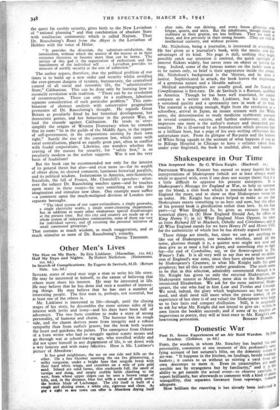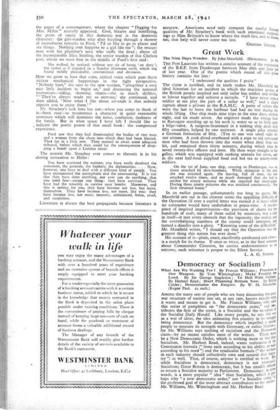Domestic War
Post D. Some Experiences of an Air Raid Warden. By Jolla Strachey. (Gollancz. 3s. 6d.) FORD, the warden, in whom Mr. Strachey has buried his own personality, comments at one moment of this profoundly satis- fying account of last autumn's blitz, on the domestic nature c" air-war. " It happens in the kitchen, on landings, beside washing' baskets ; it comes to us without us stirring a yard from our own doorsteps to meet it. Even its catastrophes are made terrible not by strangeness but by familiarity," and it is Mt' ability to get outside the actual event—to observe carefully, to report brilliantly, but afterwards to comment with a kind of Pc'enc tranquillity, that separates literature from reportage, however adequate.
How brilliant the reporting is has already been indicated in • the pages of a contemporary, where the chapter " Digging for Mrs. Miller " recently appeared. Cool, bizarre and horrifying, the point of sanity in this domestic war is the domestic character: the girl-warden who after bicyling through a shower of incendiaries remarks to Ford, " I'd so like to go to places and see things. Nothing ever happens to a girl like me'; the rescue- man with his plumber's nose who sniffs the dead ; above all the incomparable Miss Sterling, the senior warden of this Chelsea post, whom we meet first in the middle of Ford's first raid : She walked, he noticed, without any air of being on duty '; but rather as if engaged on a Sunday afternoon stroll, which she found mildly pleasurable, conventional and decorous.
How we grow to love that calm, critical voice which puts these violent mechanical happenings in the right perspective. " Nobody hurt," she says to the new warden, " altogether a very nice little incident to begin on," and discussing the national recreations—riding, shooting, tennis—she so much dislikes, " They've always made me so nervous,' she continued, and then added, Now what •I like about air-raids is that nobody expects you to enjoy them.' " Mr. Strachey's task here has not—when you come to think of it—been easy—to reconstruct a character in quiet reasonable sentences which will dominate the noise, confusion, darkness of the battle. But in what space I have left I should like to ▪ indicate the poetic power of this small book : the compressed experience.
Ford saw that they had disentangled the bodies of two men and a woman from the chaos into which they had been blasted. They lay in a little row. They seemed to await some adequate tribunal, before which they could lay the consequences of drop- ping a bomb upon a London street.
The nearest Mr. Strachey ever comes to rhetoric is in his closing invocation to Hitler :
You have scattered the nations; you have easily deceived the statesmen, the generals, the bankers, the diplomatists. . . . Now, however, you have to deal with a different kind of people. You have encountered the unemphatic and the unassuming. It is not that they have done anything, nor ever can do anything, that you need fear—except one thing: they have survived. They have had the temerity to survive your bombs. Moreover, and this is serious for you, they have become not less, but more, themselves. They have become less, not more, like you: they have become less, not more, neurotic, unbalanced, fierce, cruel, and suspicious.
Literature is always the best propaganda because literature is accurate. Americans need only compare the careful literary qualities of Mr: Strachey's book with such emotional outpour. ings as Miss Brittain's to know where the truth lies, and to know too, that help will never come too late.
GRAIIAM GREENE.































 Previous page
Previous page